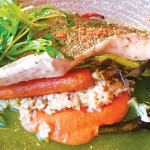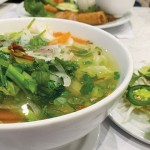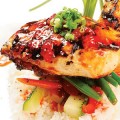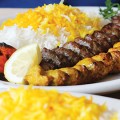Long a culinary term of art, “fusion” is often associated with the deliberate combination of two distinct traditions. From falafel tacos to ramen burgers, these endeavors are usually the work of some enterprising chef, seeking to surprise diners with something new.
Such pairings are rarely as adventurous or innovative as their creators would have customers believe (of course wrapping tikka masala in a tortilla was going to work). Sometimes—as with Nutella lasagna—these efforts are astoundingly ill conceived.
The best food fusion has nothing to do with marketing professionals and their industry buzzwords. Rather, it is born from a kind of slow-moving and organic cross-cultural exchange. In the case of Küsan Uyghur Cuisine, much of that exchange was likely made via camel.
The Turkic Uyghur (pronounced wee-goo’r) people hail from Xinjiang. The Chinese province, located in the country’s northwest, shares a western border with Pakistan, Tajikistan, Kyrgyzstan and Kazakhstan and served as a main thoroughfare on the ancient Silk Road trading route between China and the Middle East. As such, the largely desert region has developed a food culture that is unique and yet distinctly tied to its neighbors in the east and west.
The Uyghurs are a largely Muslim ethnic minority in the People’s Republic of China, and their cuisine combines traditional Chinese and Middle Eastern spices and ingredients with elements of Halal. The relative isolation of Xinjiang—Mandarin for “new frontier”—is mirrored in the scarcity of local restaurants specializing in Uyghur cooking. There are only a handful in the entire Bay Area. Küsan is the only one in the South Bay.
Located near Mineta International Airport, Küsan opened about six months ago—taking over the former location of Ramen Yamadaya. The interior features a modern minimalist aesthetic, with elegant solid wood furnishings, azure blue curtains and a reclaimed wood block accent wall. It seats about 30 patrons comfortably, and on a recent Saturday was packed for an early lunch.
The menu offers a limited selection of carefully curated dishes, but that didn’t make our choices any easier—everything sounded terrific. For starters we decided on the Uyghur salad ($6) and the eggplant with mashed garlic ($7). For our main courses we ordered the big-plate chicken ($18) and braised lamb shank ($20), and I gave the Uyghur special milk tea ($5) a whirl.
The Uyghur salad featured sliced tomatoes, raw onions and jalapeños seasoned with a light drizzling of toasted sesame oil. It was a fresh way to start the meal, but it could have done with some more oil and fewer peppers. The spice level was over the top—even for me, and I hardly ever shy away from heat—so beware.
The eggplant mash was also seasoned with toasted sesame oil. It was served chilled, which I found refreshing. It helped accentuate the sesame flavor and worked to counter the salad’s heat.
The lamb shank was served up very simply—sitting atop a piece of pillowy naan, which was itself submerged in a small pool of lamb-based broth. This dish was a testament to the power of restraint. Flaking off the bone and melting in my mouth, the lamb was cooked perfectly and seasoned expertly with just salt, sesame seeds and saffron strands.
The milk tea (aka sut chai) was brewed with salt instead of sugar and came topped with a housemade goat’s milk yogurt, which was reminiscent of Middle Eastern labneh. It was a very strange flavor at first, but I soon grew accustomed to the taste and ultimately found it quite rich and enjoyable. I would definitely order it again, and it is certainly a must-try for the adventurous foodie.
Finally, we made our way to the gigantic and beautifully presented big-plate chicken, which is also known as da pan ji. With large chunks of fluffy, stewed potatoes; tender pieces of bone-in chicken; a generous portion of green and red chilis; and a bevy of fresh, hand-pulled noodles, the dish was bathed in a rich soup and seasoned with garlic, ginger, cumin and star anise.
Despite the intimidating look of all the chilis, neither of us found the dish to be particularly spicy—I’d say it was even quite mild, especially in comparison to the salad. Each bite was warm and comforting, like eating in grandma’s kitchen. It was an absolutely stunning dish in its simplicity and elegance.
Küsan Uyghur Cuisine
1516 N 4th St, San Jose
408.899.4365
kusancuisine.com

 Menlo Park's Camper misses the forest for the trees
Menlo Park's Camper misses the forest for the trees  Pho 24's Sprawling Menu Shows Promise
Pho 24's Sprawling Menu Shows Promise 


